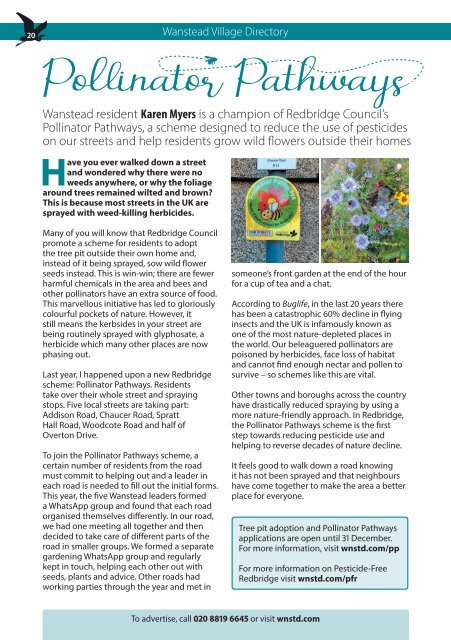November 2023
Create successful ePaper yourself
Turn your PDF publications into a flip-book with our unique Google optimized e-Paper software.
20<br />
Pollinator Pathways<br />
Have you ever walked down a street<br />
and wondered why there were no<br />
weeds anywhere, or why the foliage<br />
around trees remained wilted and brown?<br />
This is because most streets in the UK are<br />
sprayed with weed-killing herbicides.<br />
Wanstead Village Directory<br />
Wanstead resident Karen Myers is a champion of Redbridge Council’s<br />
Pollinator Pathways, a scheme designed to reduce the use of pesticides<br />
on our streets and help residents grow wild flowers outside their homes<br />
Many of you will know that Redbridge Council<br />
promote a scheme for residents to adopt<br />
the tree pit outside their own home and,<br />
instead of it being sprayed, sow wild flower<br />
seeds instead. This is win-win; there are fewer<br />
harmful chemicals in the area and bees and<br />
other pollinators have an extra source of food.<br />
This marvellous initiative has led to gloriously<br />
colourful pockets of nature. However, it<br />
still means the kerbsides in your street are<br />
being routinely sprayed with glyphosate, a<br />
herbicide which many other places are now<br />
phasing out.<br />
Last year, I happened upon a new Redbridge<br />
scheme: Pollinator Pathways. Residents<br />
take over their whole street and spraying<br />
stops. Five local streets are taking part:<br />
Addison Road, Chaucer Road, Spratt<br />
Hall Road, Woodcote Road and half of<br />
Overton Drive.<br />
To join the Pollinator Pathways scheme, a<br />
certain number of residents from the road<br />
must commit to helping out and a leader in<br />
each road is needed to fill out the initial forms.<br />
This year, the five Wanstead leaders formed<br />
a WhatsApp group and found that each road<br />
organised themselves differently. In our road,<br />
we had one meeting all together and then<br />
decided to take care of different parts of the<br />
road in smaller groups. We formed a separate<br />
gardening WhatsApp group and regularly<br />
kept in touch, helping each other out with<br />
seeds, plants and advice. Other roads had<br />
working parties through the year and met in<br />
someone’s front garden at the end of the hour<br />
for a cup of tea and a chat.<br />
According to Buglife, in the last 20 years there<br />
has been a catastrophic 60% decline in flying<br />
insects and the UK is infamously known as<br />
one of the most nature-depleted places in<br />
the world. Our beleaguered pollinators are<br />
poisoned by herbicides, face loss of habitat<br />
and cannot find enough nectar and pollen to<br />
survive – so schemes like this are vital.<br />
Other towns and boroughs across the country<br />
have drastically reduced spraying by using a<br />
more nature-friendly approach. In Redbridge,<br />
the Pollinator Pathways scheme is the first<br />
step towards reducing pesticide use and<br />
helping to reverse decades of nature decline.<br />
It feels good to walk down a road knowing<br />
it has not been sprayed and that neighbours<br />
have come together to make the area a better<br />
place for everyone.<br />
Tree pit adoption and Pollinator Pathways<br />
applications are open until 31 December.<br />
For more information, visit wnstd.com/pp<br />
For more information on Pesticide-Free<br />
Redbridge visit wnstd.com/pfr<br />
To advertise, call 020 8819 6645 or visit wnstd.com
















